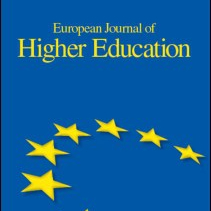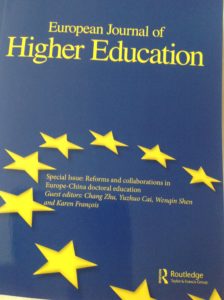 Many theories on university structures have strongly underlined the need for universities to be re-organised in a more flexible form to better respond to rapidly changing demands in their environment. Adaptation, opportunism, and income generation are among the list of strategic keywords for universities to successfully increase their self-reliance in their changing environment. As…]]>
Many theories on university structures have strongly underlined the need for universities to be re-organised in a more flexible form to better respond to rapidly changing demands in their environment. Adaptation, opportunism, and income generation are among the list of strategic keywords for universities to successfully increase their self-reliance in their changing environment. As…]]>
Many theories on university structures have strongly underlined the need for universities to be re-organised in a more flexible form to better respond to rapidly changing demands in their environment. Adaptation, opportunism, and income generation are among the list of strategic keywords for universities to successfully increase their self-reliance in their changing environment. As a threshold matter for their organisational adaptation, universities have to react by flexible strategies to various requirements and threats. To specify the requirements of strategic flexibility in European universities, I examined strategic changes and strategical actions in European universities through the institutional evaluation reports of the EUA.
In my recent article published in the European Journal of Higher Education, I analysed EUA reports for 21 universities from seven European countries. The analysis reveals that the sampled European universities follow similar strategies in organisational management, quality assurance, teaching/learning, societal service, and internationalisation. However, environmental factors such as economic conditions, demographic changes, the industrial/business sector, and higher education (HE) regulations and the universities’ institutional characteristics lead to differences in their strategic perspectives. European-wide policies and practices also influence their strategies related to continental integration and international visibility.
The factors outlined above add various requirements to the institutional strategies of sample universities, which have to adapt them to meet contemporary threats and catch developmental opportunities in their environment. I integrated the findings into a node map to summarise the requirements of strategic flexibility in universities’ core performance areas (Teaching and Learning, Quality Assurance in Teaching and Learning, Research and Research-Based Teaching, Service to Society, and Internationalisation) and Governance and Decision-Making process. However, European universities need high-level institutional autonomy to be able to update their goals and actions in each of these strategic areas and operate timely organisational changes to catch new opportunities. For this reason, policy-makers should review the HE policies in their countries to generate more space for universities to design their own financial strategies, management structures, internal quality assurance operations, and staffing systems.
Furthermore, European HE authorities may contribute to strategic flexibility by overseeing the effect of national HE policies on universities, and they should continue to develop policies and practices that induce university autonomy. On the other hand, higher university autonomy alone does not ensure the formation of a comprehensive strategic framework in European universities. Therefore, European university managers should take the unique characteristics of their institutions into account when designing strategies and operations to respond better to changing demands in their environment. Europe-wide HE units can also disseminate examples of effective strategies and successful institutional actions integrated by universities so that other universities can incorporate them in their strategic framework, if appropriate.
]]> Mentors for higher education students in companies who are expected to provide high-quality mentoring in addition to their regular tasks encounter numerous challenges. The Bologna Process has been a huge challenge for the reform of the European higher education system, its aim being to raise Europe’s higher education to a new level of quality, equality,…]]>
Mentors for higher education students in companies who are expected to provide high-quality mentoring in addition to their regular tasks encounter numerous challenges. The Bologna Process has been a huge challenge for the reform of the European higher education system, its aim being to raise Europe’s higher education to a new level of quality, equality,…]]>
Mentors for higher education students in companies who are expected to provide high-quality mentoring in addition to their regular tasks encounter numerous challenges. The Bologna Process has been a huge challenge for the reform of the European higher education system, its aim being to raise Europe’s higher education to a new level of quality, equality, comparability and compatibility of studies and degrees across Europe. In the European Union (EU), Directive 2005/36/EC on the recognition of professional qualifications (10) regulates embedding practical training into certain, professionally oriented study programmes. As a result, universities and employers are now supposed to jointly participate in the systematic process of introducing students to their respective jobs. This should be achieved with the help of entrepreneur education and practical training along with the process of determining the graduates’ employability.
The article published in the European Journal of Higher Education describes the characteristics of mentoring higher education students in companies (formal mentoring, mentoring as a dyadic relationship and mentoring functions) which is a field the least researched, particularly when evaluating effects of mentoring. The purpose of the study was to determine what mentors working with students in companies in certain European countries (Slovenia, Croatia, Italy, Slovak Republic) think about mentoring after adoption of the Bologna Process. The research was based on the analysis of written self-reflections provided by 57 mentors who had participated in a programme of education and training designed for mentors between 2011-2014 at the University of Ljubljana Faculty of Arts (Slovenia) within the international project of the Operational Programme Human Resources Development which was financed by the European Social Fund (ESF), Ministry of Higher Education, Science and Technology and some companies. Invited to the programme were mentors from various companies who accept students of the I and II level of Bologna studies of sociology and humanity, Faculty of Arts, Ljubljana to practice. Invitees were also foreign mentors who presented good practice after the introduction of the Bologna process.
The aim was to find out mentors’ perceptions of their work, their positive and negative experiences. This study’s findings bring new insights into how the Bologna Process has altered mentoring and its formal organisation. The effects of mentoring are both positive and negative. Mentors’ views demonstrate that mentoring is a complex and very responsible work which should be more appreciated. Mentors from all four countries are aware of the significance of their proper work, personal traits and a positive professional self-concept. That is why mentors in companies require training in the field of mentorship, a proper status, remunerable mentoring work and the exchange of views and experience with mentors from other companies.
Mentors from all the countries concerned stressed that quality mentoring in companies depends on pre-planning, better implementation and planned evaluation. This formal planning introduced by the Bologna process, which requires universities and colleges to prepare new or updated curricula for practical training. These curricula require students to be actively involved in the work of companies, thereby gaining specific skills, competencies and professional growth. Types of such practical training and higher education were presented: two-cycle system in the United Kingdom, three types of higher education institutions in Germany (dual type, etc.), Hungary (universities of applied sciences) and Slovenia (public universities which have various study programmes, and have compulsory practice for students as well as Career Centres).
The research suggests that faculties create a common web portal and forum involving a list of companies which can present themselves, offer practical training and employment opportunities. The portal should not only be accessible by one university or country but should have an international dimension. This would also improve the Erasmus exchange of students in practical training in various companies across Europe, enhance cooperation, exchange of knowledge and experience and promote student employment.
The findings are important for improving the quality of mentoring in companies and establishing an EU network of mentoring companies in the future. On the basis of the identified mentoring effects, new proposals for better mentoring in companies in some European countries have been made. As the results of this study are quite limited, further research is needed in wider European arena.
]]>
 In 2018, we await another Ministerial Summit to lay the roadmap for the future of European higher education within the European Higher Education Area (EHEA). In June, the Ministers responsible for higher education from 48 member countries, the European Commission, and several stakeholder organisations will gather in Paris for the tenth summit since the signature…]]>
In 2018, we await another Ministerial Summit to lay the roadmap for the future of European higher education within the European Higher Education Area (EHEA). In June, the Ministers responsible for higher education from 48 member countries, the European Commission, and several stakeholder organisations will gather in Paris for the tenth summit since the signature…]]>
In 2018, we await another Ministerial Summit to lay the roadmap for the future of European higher education within the European Higher Education Area (EHEA). In June, the Ministers responsible for higher education from 48 member countries, the European Commission, and several stakeholder organisations will gather in Paris for the tenth summit since the signature of the Bologna Declaration in 1999. Much of the attention at the Summit will undoubtedly be devoted to the implementation of the existing Bologna commitments. As a result of the Bologna Process, there has been an unprecedented convergence of higher education policies and practices across European countries. Especially remarkable is the growth and consolidation of quality assurance. All EHEA countries now have external quality assurance agencies, whereas at the inception of the Bologna Process only about a third did so. The European Quality Assurance Register, a legal body that directly emerged from the Bologna Process and lists agencies that comply with the Standards and Guidelines for Quality Assurance in Europe in the EHEA, is another deliverable of the Bologna Process.
Yet, the successive Bologna implementation reports, as well as the report of the Bologna Working Group on implementation[1], show that the EHEA is still far from fully meeting the objectives agreed upon by the Ministers in the Ministerial Communiques. The EHEA can be seen as an example of “multi-speed” intergovernmental cooperation, for different countries implement policies selectively and at different paces, depending on their national higher education context. Some of the core divergences in implementation concern the basic Bologna “tools”. Some short study programs in EHEA countries are not part of the Bologna degree structures. Discrepancies in the definition of learning outcomes that underlie academic qualifications are still common. This hampers cross-European recognition of qualifications. The National Qualification Frameworks, another of the basic Bologna “tools”, are also not fully implemented everywhere.
The main open question is what else will be highlighted among the policy objectives in the forthcoming Paris Communiqué. The Yerevan Communiqué in 2015 brought into the political limelight the need for strengthening the quality of teaching and learning. This policy area is likely to remain high on the political agenda, for the work has only just begun and ample possibilities exist to link it to other considered priority areas, such as the use of digital technologies in education, enhancing teacher support, and supporting students from non-traditional backgrounds.[2] As indicated by the draft report of the (take a deep breath) “Bologna Working Group on Policy Development for New EHEA Goals”, closer links between EHEA and the EU’s European Research Area are also a desideratum.[3]
Also among the top priorities, surely, is encouraging higher education institutions “to play an active role in society and to enhance the capacity of students and staff to be active and responsible citizens.”[4] This goal aligns with the most recent policy of the European Commission’s “modernization agenda for European higher education”. The European Commission is a full member of the Bologna Follow-Up Group, the executive arm of the EHEA. Over the years, the Commission successfully bridged and synchronized European Union (EU) policies and instruments (such as the European Credit Transfer and the Accumulation System – ECTS, Diploma Supplement, European Qualification Frameworks, mobility, etc.) and those adopted within the EHEA. Furthermore, the European Commission also played an indispensable role in the implementation of the EHEA objectives by offering support through EU funding schemes, especially the EU flagship programme Erasmus+.
The “Renewed EU Agenda for Higher Education” released in May 2017, focuses on four priority areas: (1) Promoting excellence in skills development and tackling future skills mismatches; (2) Building inclusive and connected higher education systems; (3) Ensuring that higher education institutions contribute to innovation; and (4) Supporting effective and efficient higher education systems.[5] Compared to earlier modernization agenda documents, this new policy offers a more balanced approach to strengthening higher education’s contribution to society, including not only economic development but also social inclusion and social progress. Drafted in the time following the global financial crisis and published in 2011, the earlier modernization agenda – “Supporting growth and jobs: An agenda for the modernisation of Europe’s higher education systems” – clearly prioritized higher education’s contribution to the economy while omitting to emphasize its civic role. Now the agenda expresses explicitly that higher education must also play its part in tackling Europe’s social and democratic challenges. In 2017, these challenges were formidable. Europe was still marked by the refugee crisis; a crisis which continues to polarize EU member states, has led to growing support for populist anti-immigration parties in several member states, and, arguably, played a role in the United Kingdom vote to leave the European Union a year earlier. The agenda alludes to higher education’s role “…in restoring trust in democratic life, institutions and [in times of post-truth politics also trust in] the role of independent research”. Some concrete objectives include helping students develop social and civic competences and higher education institutions build closer links with local communities. Concrete proposals involve awarding students credit points for community and voluntary activities and supporting recognition of qualifications among refugees.
Apart from the rise of far-right parties in several EU member states, in 2017 we witnessed the further consolidation of illiberal democracies in Hungary and Poland. In both countries, governments sought to override the constitutional autonomy of the legislative systems, and – in Hungary – undermined the academic freedom of the Central European University (CEU), an American-accredited university. Amendments to Hungarian higher education legislation passed in April 2017 were popularly referred to as “lex CEU”. Higher education institutions and individuals from across the world joined the #IstandwithCEU campaign, which is ongoing. The European Commission issued a statement that “…the law is not compatible with the fundamental international market freedoms, notably the freedom to provide services and the freedom of establishment but also with the right of academic freedom, the right to education and the freedom to conduct a business as provided by the Charter of Fundamental Rights of the European Union, as well as with the Union’s legal obligations under international trade law,”[6] and decided to take legal action against Hungary. Not much progress has been made since, except that CEU was granted an extension to the deadline for compliance with the aforementioned legislation. Consequently, in December, CEU launched #SeeUatCEU Student Recruitment Campaign, assuring students that they will be able to complete their degrees.[7] However, the future of CEU’s operations in Hungary is at present still unclear.
Outside the EU, the “2017 Free to Think” Report of the Scholars at Risk Network[8] also mentions threats to institutional autonomy and academic freedom of higher education institutions in Russia, notably the European University in St. Petersburg. In March 2017, the local court in St Petersburg revoked the educational license of this university, apparently in response to an official complaint against the gender studies program offered by the university filed by an ultra-conservative member of the parliament. Like CEU, the European University in St Petersburg was founded with the support of US-based foundations, including the Open Society Foundation.[9]
The Report also lists exceptional threats to academic freedom in Turkey. Following the failed coup of 2016, the report estimates that “7,023 academic and administrative personnel have been targeted for dismissal from their positions, and 294 students have been expelled in accordance with a series of decrees issued under a state of emergency that continues to be extended. At least 990 scholars, staff, and students have been detained or arrested, with warrants served for at least 318 more.”[10] Furthermore, over the past year, the government issued decrees withholding passports from scholars.[11]
All of the aforementioned countries in which there are such blatant violations of academic freedom and or institutional autonomy are full members of the EHEA. Given the consensual style of decision-making within the Bologna Follow-Up Group, and the essentially voluntary nature of this intergovernmental cooperation, it is questionable whether any sort of reprimand or sanctions – such as withdrawal from membership – for the violations is possible or likely to be issued by the Ministers during the Paris Summit. The default option is that the Ministers will reaffirm their commitments to the basic principles, and then leave it up to the governments to interpret the implementation.
Another unanswered question for 2018 concerns the United Kingdom. The exit negotiations next year will tackle several of key questions concerning higher education and research. While the UK’s world-class universities might not experience much change, the lower-ranking institutions are wearily awaiting the exit settlement. The domestic-rate tuition fees for EU nationals, as well as UK loans for full-time students from the EU, are likely to be scrapped, thus affecting demand from prospective EU students who constitute a considerable share UK’s student body. Reciprocally, the ability of UK students to study in EU countries may be hampered. UK’s participation in the Erasmus+ programme, too, is under question, as is its participation in the Horizon 2020 funding of research, of which the UK higher education institutions have been among the most successful beneficiaries. Finally, depending on how the question of the freedom of movement of workers is resolved, and if a special arrangement for higher education sector can be made, the ability of UK’s institutions to hire academic staff from EU countries might also be adversely affected.
The story of European higher education in 2017 is indeed full of challenges. On a more positive note, 2017 also marked the 30th anniversary of the Erasmus programme, which was launched by the European Commission in 1987 to support student exchanges. It is, rightly, considered one of EU’s most successful funding schemes for education, training, youth and sport.
All the mentioned developments offer ample opportunities for scholarly investigation. The European Journal of Higher Education (EJHE) welcomes submissions that offer comprehensive coverage of theoretical and methodological approaches to the study of higher education, analyses of European and national higher education reforms and processes, and comparative studies of higher education within Europe or comparative studies of European and non-European higher education. We pride ourselves on a stellar Editorial Board, a pool of dedicated reviewers, and a world-leading academic publisher. Many thanks to the entire EJHE community for continued commitment to this journal.
[1] Working Group 2 ” Fostering implementation of agreed key commitments”, 26 October 2017:
http://media.ehea.info/file/20171109-10-Tartu/14/2/BFUG_EE_RU_56_4_5aFinalReport_840142.pdf
[2] Working Group 3 “Policy Development for New EHEA Goals”, 25 October 2017:
http://media.ehea.info/file/20171109-10-Tartu/42/9/BFUG_EE_RU_56_4_2aFinalReport_838429.pdf
[3] Ibid.
[4] Working Group 3 “Policy Development for New EHEA Goals” Draft General Recommendations, 23 October 2017: http://media.ehea.info/file/20171109-10-Tartu/43/1/BFUG_EE_RU_56_4_2bDraftRecommendations_838431.pdf
[5] COMMUNICATION FROM THE COMMISSION TO THE EUROPEAN PARLIAMENT, THE COUNCIL, THE EUROPEAN ECONOMIC AND SOCIAL COMMITTEE AND THE COMMITTEE OF THE REGIONS on a renewed EU agenda for higher education COM(2017) 247 30 May 2017:
https://ec.europa.eu/education/sites/education/files/he-com-2017-247_en.pdf
[6] http://europa.eu/rapid/press-release_MEX-17-1116_en.htm
[7] https://www.ceu.edu/article/2017-12-06/ceu-launches-seeuatceu-student-recruitment-campaign
[8] https://www.scholarsatrisk.org/wp-content/uploads/2017/09/Free-to-Think-2017-Executive-Summary.pdf
[9] http://monitoring.academicfreedom.info/reports/2017-03-20-european-university-st-petersburg
[10] https://www.scholarsatrisk.org/wp-content/uploads/2017/09/Free-to-Think-2017.pdf, p. 12
[11] https://www.scholarsatrisk.org/wp-content/uploads/2017/09/Free-to-Think-2017-Executive-Summary.pdf
]]> The year 2017 marked my first year as the book reviews editor for the European Journal of Higher Education. It has been a successful year in the sense that it was possible to ensure the publication of at least one book review in each issue and establish a set of submission as well as style…]]>
The year 2017 marked my first year as the book reviews editor for the European Journal of Higher Education. It has been a successful year in the sense that it was possible to ensure the publication of at least one book review in each issue and establish a set of submission as well as style…]]>
The year 2017 marked my first year as the book reviews editor for the European Journal of Higher Education. It has been a successful year in the sense that it was possible to ensure the publication of at least one book review in each issue and establish a set of submission as well as style guidelines. At the same time, the higher education research community is so active that there have been many more books published than we could ever review. Therefore, I want to use this editorial to briefly mention at least some more books that have been published in 2017 and which might be of interest for the European higher education research community. Obviously, this brief selection faces the same problem as the book reviews section in general in the sense that it can only be a somewhat subjective selection of titles out of a much larger pool of books published in 2017, most of which will be interesting and relevant for at least parts of the community. At this point, I want to use the opportunity to thank all the authors who contributed to the book reviews section in 2017 by taking the time to write a review for the European Journal of Higher Education. This section would not be possible without their help.
Bleiklie, Ivar, Enders, Jürgen, Lepori, Benedetto (Eds.). Managing Universities Policy and Organizational Change from a Western European Comparative Perspective. Basingstoke: Palgrave Macmillan, ISBN: 9783319538648, 93.59 € (hardcover), 329 pp.
This volume investigates how modern universities are organized and managed. Its main focus is on the question if 30 years of university reforms have resulted in stronger managerial structures and leadership control. The book is based on a large scale comparative study of 26 universities across eight European countries. It highlights the strength of university managerial structures, the role of academics, and how universities relate to and depend on their environment.
Collins, Christopher S., Buasuwan, Prompilai (Eds.). Higher Education Access in the Asia Pacific. Basingstoke: Palgrave Macmillan, ISBN: 9783319586694, 48.87€ (hardcover), 166 pp.
This edited volume investigates higher education in the Asia Pacific region. It uses empirical, evaluative, and philosophical perspectives to study the role of higher education as a human right in the Asia Pacific context. While higher education has grown throughout the region questions related to price, accessibility, mobility, and government funding shape the degree to which higher education may be viewed as a human right.
Deem, Rosemary, Eggins, Heather (Eds.). The University as a Critical Institution?. Rotterdam: Sense Publishers, ISBN: 9789463511148, 54.00 USD (softcover), 248 pp.
The book addresses the central question whether universities can survive as critical organizations in today’s environment. It focuses on three main themes: governance, critical regulation and regulated criticism; growth, equality, movement and instability in higher education systems; and teaching and learning. The volume is international in its outlook, including empirical cases from higher education systems within Europe and beyond.
Hay, Iain. How to be an Academic Superhero Establishing and Sustaining a Successful Career in the Social Sciences, Arts and Humanities. Cheltenham: Edward Elgar Publishing, ISBN: 9781786438133, USD 40.00 (softcover), 256 pp.
The book draws from the author’s decades of observation and experience in academia and serves as a guide to overcome the challenges of fostering a successful academic career. It includes an overarching focus on holistic career development as well as specific chapters on mentorship, networking, job applications and interviews, publishing, funding and more.
Mattingly, Paul H. American Academic Cultures A History of Higher Education. Chicago: University of Chicago Press, ISBN: 9780226505268, USD 35.00 (softcover), 464 pp.
This book focuses on the history of higher education in the USA. The author sees this history as the product of different generational cultures, each grounded in its own moment in time and driven by historically distinct values that generated specific problems and responses. He further argues that we see through this analysis of each culture in their historical moment that the politics of higher education are to a strong degree driven by the dominant culture of the time.
Menand, Louis, Reitter, Paul, Wellmon, Chad (Eds.). The Rise of the Research University A Sourcebook. Chicago: University of Chicago Press, ISBN: 9780226414713, USD 32.50 (softcover), 400 pp.
The editors of this volume argue that the modern research university is a global institution with a rich history. In this book they bring many different important historical texts together, assembling a fascinating collection of primary sources—many translated into English for the first time. The authors also enrich the texts with short essays that contextualize their importance. Through this they offer a portrait of the early research university.
Mittelman, James H. Implausible Dream The World-Class University and Repurposing Higher Education. Princeton: Princeton University Press, ISBN: 9780691165189, USD 39.50 (hardcover), 288 pp.
The author of this book argues that the paradigm of the world-class university is an implausible dream for most institutions of higher education around the world. In his view, their pursuit of this paradigm leads universities to shift away from their core missions of cultivating democratic citizenship, fostering critical thinking, and safeguarding academic freedom. Instead these institutions focus on a new form of utilitarianism that favors market power over academic values. The author exemplifies his argument with empirical cases from the USA, Finland, and Uganda.
Sundet, Marit, Forstorp, Per-Anders, Örtenblad, Anders (Eds.). Higher Education in the High North Academic Exchanges between Norway and Russia. Dordrecht: Springer, ISBN: 9783319568317, 93.59 € (hardcover), 285 pp.
This edited volume investigates how “Northern futures” are transformed through regional cooperation. The authors study the social, cultural and political aspects of higher education and the exchanges of learning and people in the Euro-Arctic Barents region, especially between Norway and Russia. The authors show that educational cooperation between Norway and Russia is possible, but that existing practices are also vulnerable to changes .
Troschitz, Robert. Higher Education and the Student From welfare state to neoliberalism. London: Routledge, ISBN: 9781138213500, USD 150.00 (hardcover), 236 pp.
The book starts from the observation that Britain, and in particular England, has radically transformed its higher education system over the last decades. In line with neoliberal values, universities have increasingly been required to act like businesses, and students are frequently referred to as customers. In this, the book focuses on the relation between the changing function of higher education and what one considers the term ‘student’ to stand for.
Whitchurch, Celia, Gordon, George (Eds.). Reconstructing Relationships in Higher Education Challenging Agendas. London: Routledge, ISBN: 9781138810822, USD 48.95 (softcover), 192 pp.
This volume looks behind formal organizational structures and workforce patterns in higher education to consider the significance of relationships, particularly at local and informal levels, for the aspirations and motivations of academic faculty. Based on an institutional perspective, relationships are seen to be a critical factor in the realization of strategy, and to have a disproportionate effect, both positively and negatively. However, little attention has so far been paid to the role that they play in understanding the interface between individuals and institutions. This gap is addressed by this volume.
]]>
 The higher education institution, individual, disciplinary, professional and national cultural dimensions are entities that provide resources for the construction of academic identities. Over the last decades, academic identities at the universities in Western societies have undergone a profound change due to the establishment of such global models as a research university, Bologna Process, knowledge economy…]]>
The higher education institution, individual, disciplinary, professional and national cultural dimensions are entities that provide resources for the construction of academic identities. Over the last decades, academic identities at the universities in Western societies have undergone a profound change due to the establishment of such global models as a research university, Bologna Process, knowledge economy…]]>
National University of Life and Environmental Sciences of Ukraine

The higher education institution, individual, disciplinary, professional and national cultural dimensions are entities that provide resources for the construction of academic identities. Over the last decades, academic identities at the universities in Western societies have undergone a profound change due to the establishment of such global models as a research university, Bologna Process, knowledge economy etc. Moreover, the academic identities at universities in Western societies have also institutionalised as global models by themselves. They prescribe academics not only teaching but also doing research and knowledge transfer. The less developed countries aiming to integrate into the Western society diffuse the global cultural models into the specific national context. Meanwhile, the enactment of the global models can result in means-ends decoupling at the nation-state level.
The article published in the European Journal of Higher Education aims to explore the construction of the academic identities under the conditions of means-ends decoupling at the nation-state level. For our research, we choose Ukraine. Though in 1991 Ukraine gained independence after the fall of the Soviet Union, the Ukrainian professional and national dimensions of higher education have inherited a lot from the Soviet model. In 2014, after the Revolution of Dignity, the Ukrainian government has claimed a course on European integration what led to the adoption of the several legislative initiatives in higher education. The teaching workload of academics was decreased from 900 to 600 hours per year, the academics to allocate more time for research. The education ministry also changed the requirements to the scientific titles aiming to enhance the quality of higher education though the focus of the academics on the research at the international level and improvement of their knowledge of English. However, as the institutional environment was not reformed to align with the global models, the policy initiatives reflect a case of means-ends decoupling at the nation-state level.
Our findings reveal that means-ends decoupling at the nation-state resulted in the institutional complexity hinders either the decrease of the teaching workload or the new demands to the scientific titles have led to the intended outcomes – identities of Ukrainian academics to align with those prescribed by the global models. It occurs as the global models prescribe not only practices and identities for individual actors but also for the nation-state and organisations, thus relevant national, professional and organisational cultural dimensions. Furthermore, our findings reveal that institutional complexity next to the practices of the individuals who head the higher education institution do not align with the global model of the research university result in means-ends decoupling at the organizational level. The latter causes cultural complexity. To summarise, institutional and cultural complexity experienced by individuals trigger means-ends decoupling at the institutional level. Meanwhile, the awareness of academics about them to sustain means-ends decoupling results both in cognitive dissonance and identity conflict.
As the negative consequences of means-ends decoupling is the diversion of resources, in Ukrainian case it concerns human intellectual capital. The longer mean-ends decoupling at the nation-state level will last the more human capital will be lost.
]]> Internationalization has become an agenda of key strategic importance to higher education institutions across the world, in response to increasing geopolitical and economic imperatives. In recent years, there has been a mounting concern regarding the effects of predominantly neoliberal drivers for internationalization and a growing interest in rethinking and reconceptualising internationalization in higher education. The…]]>
Internationalization has become an agenda of key strategic importance to higher education institutions across the world, in response to increasing geopolitical and economic imperatives. In recent years, there has been a mounting concern regarding the effects of predominantly neoliberal drivers for internationalization and a growing interest in rethinking and reconceptualising internationalization in higher education. The…]]>

Internationalization has become an agenda of key strategic importance to higher education institutions across the world, in response to increasing geopolitical and economic imperatives. In recent years, there has been a mounting concern regarding the effects of predominantly neoliberal drivers for internationalization and a growing interest in rethinking and reconceptualising internationalization in higher education.
The papers in this special issue ‘Internationalization of Higher Education: drivers, rationales, priorities, values and impacts’ published in the European Journal of Higher Education aim to contribute to a critically reflective interdisciplinary discussion on the phenomena of internationalization. They provide insights into the challenges and implications for higher education policy makers, leaders and practitioners to adopt more ethical and values-driven internationalisation strategies and practices. They argue the need for systemic change in the ways we conceptualise ‘excellent’ and ‘world class’ knowledge, research and teaching in both national and institutional contexts. Our intention is to contribute towards rethinking what the process of internationalising the university can entail, and reflect the need for a deep-reaching systemic change in the core missions of higher education to enable the generation, adaptation and diffusion of knowledge and to enhance the quality of interpersonal relationships in cross-cultural encounters. The papers propose new methods and approaches to research and practice that explore higher education internationalisation as a multidimensional, dynamic and potentially transformative process.
]]> A significant proportion of the literature on higher education for some time has focused on the way that global trends in university policy play out regionally, nationally, or locally. Particular attention has been paid to the increasing presence of inter-university (and inter-country) competition and private funding for universities, and the impact this has on the…]]>
A significant proportion of the literature on higher education for some time has focused on the way that global trends in university policy play out regionally, nationally, or locally. Particular attention has been paid to the increasing presence of inter-university (and inter-country) competition and private funding for universities, and the impact this has on the…]]>
A significant proportion of the literature on higher education for some time has focused on the way that global trends in university policy play out regionally, nationally, or locally. Particular attention has been paid to the increasing presence of inter-university (and inter-country) competition and private funding for universities, and the impact this has on the ways that universities are governed. These trends, associated with the notion of a ‘knowledge economy’, are seen as somewhat anathema to higher education and its historical values, or ethos. Within this, there is a great deal of discussion about the way that students are framed or affected by these policies, such as tuition fees fostering more of a customer-like relationship between them and the university, and more passive approaches to learning. There is little research, though, that investigates students’ own perspectives of this topic. The article published in the European Journal of Higher Education makes an exploratory foray into this area by investigating how a small group of students in Germany and England understood higher education’s ethos. The question here is whether they associate universities with ‘older’ or ‘newer’ models, i.e. whether they might consider the new one as somehow inappropriate.
This work draws on a form of neo-institutionalism, a theoretical approach that sees organisations as operating within, and aligning themselves to, social fields characterised by taken-for granted practices and worldviews. One of the foundational ideas in this approach is that these fields are underpinned by ‘institutional myths’, a fictitious mental ideal that serves as a collective, normative guide to how people and organisations think and behave. This paper suggests – as others have done – that the ideas associated with Wilhelm von Humboldt form an institutional myth, that is, that universities are geared towards social progress through the principles of scientific training, non-utilitarian science, and higher education’s independence from political and commercial pressures. These principles run counter to the notion of higher education as a servant primarily of the economy, for example, and much of the critical commentary of policy and governance in the sector can be connected with this tension.
It should be noted that there are alternative candidates for institutional myths. Other formulations include John Henry Newman’s ‘Idea of the University’, a Confucian understanding of higher education, and there are others such as Islamic ones. Von Humboldt was chosen in part because of his strong associations with German higher education. The comparison between Germany and England was made on the basis that the former has been more (but not entirely) insulated from the changes associated with the knowledge economy than the latter. It might then be expected that students in both countries have different conceptualisations of what universities are ‘all about’.
In practice, both groups of students had very similar ideas around of the principles that underpinned universities, namely:
- Independence and non-profit orientations in research;
- Systematic thought;
- Personal independence;
- Public knowledge;
- A Broad disciplinary base;
- Equality and meritocracy;
- Social tolerance;
Some of these values can be connected with ‘Humboldtian’ visions of the university, while others, such as equality/meritocracy and social tolerance, are post-war additions. We can see, though, that the students largely associated universities with an ethos that at least pre-dates the knowledge economy. That students saw universities as founded on – and fostering – personal independence connected with a strong sense of being the key agents in their own development, i.e. not passive customers.
There were, though, differences between the groups. In addition to the values above, the English students were more accepting of tuition fees as a personal investment, and the notion that universities should generate profit to allow for organisational self-sufficiency and development. As is well-documented in the literature, levying fees is potentially counter to equality and meritocracy, and a commercial orientation runs counter to independence in research as it skews attention and funding towards economic outcomes. Few of the English students noticed these contradictions, and the suggestion here is that they had simultaneously internalised some of the ‘newer’ and ‘older’ principles. This is, though, exploratory work and the sample here is too small to draw broader conclusions, and as such, further research would be required in order to do so.
]]> European Journal of Higher Education Call for papers for Special issue on Plurilingual expatriate teachers’ in Higher Education: roles and impacts Guest Editors: Silvia MELO-PFEIFER & Patchareerat YANAPRASART Rationale Higher education scenarios have been increasingly dealing with issues such as the internationalization of staff, students and teachers and with the evaluation of their performances, regarding…]]>
European Journal of Higher Education Call for papers for Special issue on Plurilingual expatriate teachers’ in Higher Education: roles and impacts Guest Editors: Silvia MELO-PFEIFER & Patchareerat YANAPRASART Rationale Higher education scenarios have been increasingly dealing with issues such as the internationalization of staff, students and teachers and with the evaluation of their performances, regarding…]]> European Journal of Higher Education
European Journal of Higher Education
Call for papers for Special issue on
Plurilingual expatriate teachers’ in Higher Education: roles and impacts
Guest Editors: Silvia MELO-PFEIFER & Patchareerat YANAPRASART
Rationale
Higher education scenarios have been increasingly dealing with issues such as the internationalization of staff, students and teachers and with the evaluation of their performances, regarding rankings, competitiveness comparisons, accountability and international attractiveness of institutions. In this process, educational institutions are not only expected to attract international students but also to internationalize their faculties by recruiting the most talented staff irrespective of their country of origin or their scientific approach to support this goals of internationalization.
Crisscrossing actual thematic strands related to academic linguistic policies, quality evaluation in Higher Education and internationalization strategy, this special issue will focus on the roles and the impacts of plurilingual emigrant teachers in Higher Education as perceived and described by institutions, colleagues and students.
Under the label ‘international’, synonymous with modernity and attractiveness, English, often portrayed as ‘the language of internationalization’. The aim of this special issue is to pay a closer look not only on the policy of English as academia lingua franca, but also on other linguistic contexts and constellations in the following scenarios:
– teachers whose first language is the institutional/local langue and teach in another language;
– teachers whose first language is not the institutional/local language teach in the institutional/local language;
– teachers whose first language is not the institutional/local language teach in another language.
As a matter of fact, the problematics attached to the languages in which teachers are called to teach and socialize in, have so far attracted little attention in academic research. The most studied scenario has been until now attached to English linguistic competencies, disregard of other languages. Additionally, regarding the evaluation of non-native teachers in Higher Education, a particular attention was given to students’ perception of quality, efficacy and professionalism, and the way beliefs about linguistic competence mediates that perception, this in terms of the dichotomy between “normativity”, “idealism”, “correctness” and “authenticity”, “creativity”, “personality”. Some thematic strands worthwhile further investigations that will be dealt with in the scope of this special issue (but not limited to) are:
Students’, Peer’s and institutional perception of plurilingual emigrant Higher education teachers on the quality of teaching and learning ;
Challenges of non-native teachers in the academia;
Socialization of emigrant teachers: tension, conflicts and hindrances;
Language policy in internationalized universities and its impact on teaching practices and teaching performance;
Role and impact of plurilingual teachers in academic settings in the time of internationalization: resources or obstacles;
Between top-down decisions and bottom-up practices in multilingual universities: contexts and implications
Calendar
Launching of call for paper: 1 September 2017
Reception of abstracts: 1 January 2018
Acceptance of abstracts: 1 Mars 2018
Reception of full-contributions: 31 July 2018
Peer-review period: 1 October 2018
Submission of revised paper: 1 December 2018
Publication date: Autumn 2019, 9(3) 2019
About Guest editors
Sílvia Melo-Pfeifer is Associate Professor in the Department of Education, at the University of Hamburg (Germany). Her professional website: https://www.ew.uni-hamburg.de/ueber-die-fakultaet/personen/melo-pfeifer.html.
Patchareerat Yanaprasart is a lecturer at the Ecole de langue et de civilisation françaises, University of Geneva (Switzerland). Her professional website: https://www.unige.ch/lettres/elcf/fr/contact/pageenseignants/yanaprasart/.
|
Contacts Silvia MELO-PFEIFER University of Hamburg |
Patchareerat YANAPRASART University of Geneva |
 Doctoral education is deemed as the primary source of research productivity and innovation in the global knowledge economy. There has been an increasing attention to the development and transformation of doctoral education worldwide. In the past years, there are growing interests and practices in EU-China collaboration in doctoral education. The increasingly intensified collaboration demands European…]]>
Doctoral education is deemed as the primary source of research productivity and innovation in the global knowledge economy. There has been an increasing attention to the development and transformation of doctoral education worldwide. In the past years, there are growing interests and practices in EU-China collaboration in doctoral education. The increasingly intensified collaboration demands European…]]> Doctoral education is deemed as the primary source of research productivity and innovation in the global knowledge economy. There has been an increasing attention to the development and transformation of doctoral education worldwide. In the past years, there are growing interests and practices in EU-China collaboration in doctoral education. The increasingly intensified collaboration demands European and Chinese actors to have shared understandings of doctoral education as well as advanced knowledge and research concerning the collaboration practices.
Doctoral education is deemed as the primary source of research productivity and innovation in the global knowledge economy. There has been an increasing attention to the development and transformation of doctoral education worldwide. In the past years, there are growing interests and practices in EU-China collaboration in doctoral education. The increasingly intensified collaboration demands European and Chinese actors to have shared understandings of doctoral education as well as advanced knowledge and research concerning the collaboration practices.
The special issue EU-China cooperation in doctoral education published in the European Journal of Higher Education focuses on the reforms and collaborations in EU-China doctoral education. It provides an insightful picture of the recent reforms in doctoral education in China and in the EU countries.The special issue stems from the three-year EU–China DOC project ‘Enhancing the Visibility of European Higher Education and Strengthening the Dialogue and Cooperation with Chinese Stakeholders in the Field of Doctoral Education’, which has been implemented from 2013 to 2016 under the EU Erasmus Mundus framework.Reflection and insights included in this special issue give us deeper understanding on a number of important issues, such as mutual understanding, awareness, development of joint programmes and factors related to the academic development of Chinese overseas doctoral students.
]]>
 In Germany, approximately 28% of first-year bachelor students from 2008 to 2009 dropped out without completing their first bachelor’s degree (Heublein 2014). Moreover, above average rates of 31% to 39% were found in the so called MINT (mathematics, informatics, natural sciences, technology; a German acronym for the term STEM) subjects. Previous studies have revealed that…]]>
In Germany, approximately 28% of first-year bachelor students from 2008 to 2009 dropped out without completing their first bachelor’s degree (Heublein 2014). Moreover, above average rates of 31% to 39% were found in the so called MINT (mathematics, informatics, natural sciences, technology; a German acronym for the term STEM) subjects. Previous studies have revealed that…]]>
In Germany, approximately 28% of first-year bachelor students from 2008 to 2009 dropped out without completing their first bachelor’s degree (Heublein 2014). Moreover, above average rates of 31% to 39% were found in the so called MINT (mathematics, informatics, natural sciences, technology; a German acronym for the term STEM) subjects. Previous studies have revealed that one of the main factors for dropout and similar outcomes (such as dropout intention) is academic motivation (e.g. Vallerand, Fortier, and Guay 1997; Vallerand and Bissonnette 1992). Furthermore, according to Heublein et al. (2010), a lack of academic motivation often led to relatively early dropout, especially in bachelor programmes at German higher education institutions. However, to date, most empirical research has focused on a single global relationship between academic motivation, based on self-determination theory (SDT; Deci and Ryan 2000), and educational outcomes.
Therefore, the aim of study published in the European Journal of Higher Education was to answer the question: Do the effects of academic motivation, more precisely, intrinsic motivation (individuals perform an activity because they find it interesting in itself and do it without any external consequences, e.g. they study for the sheer pleasure), identified regulation (individuals identify with the underlying value of an activity, e.g. they study because it is important for the future career), introjected regulation (individuals perform an activity because of internal pressures, such as pride or guilt, e.g. they study to prove themselves that they are intelligent), and external regulation (individuals engage in an activity to receive a reward or to avoid punishment, e.g. they study to earn more money later on), on intention to drop out differ between students?
Using the method of clusterwise linear regression, our main purpose was to reveal groups of students with group-specific relationships between SDT motivation and the intention to drop out at the beginning of studies. We identified three subpopulations of students.
Results showed that intrinsic motivation was the strongest significant predictor in each of the three groups, whereas in none of the groups external regulation did significantly predict the intention to drop out. Moreover, our results revealed that the stronger the group-specific impact of intrinsic motivation on the intention to drop out, the higher the group-specific average intention to drop out. In particular we detected one group of students, in which it seems that even small changes in the degree of intrinsic motivation could lead to the decision to drop out. Therefore our findings suggest that it is important for higher education institutions to create environments that enhance students’ intrinsic motivation, especially in order to prevent potential dropout. Measures that may enhance intrinsic motivation are discussed in our paper.
]]>